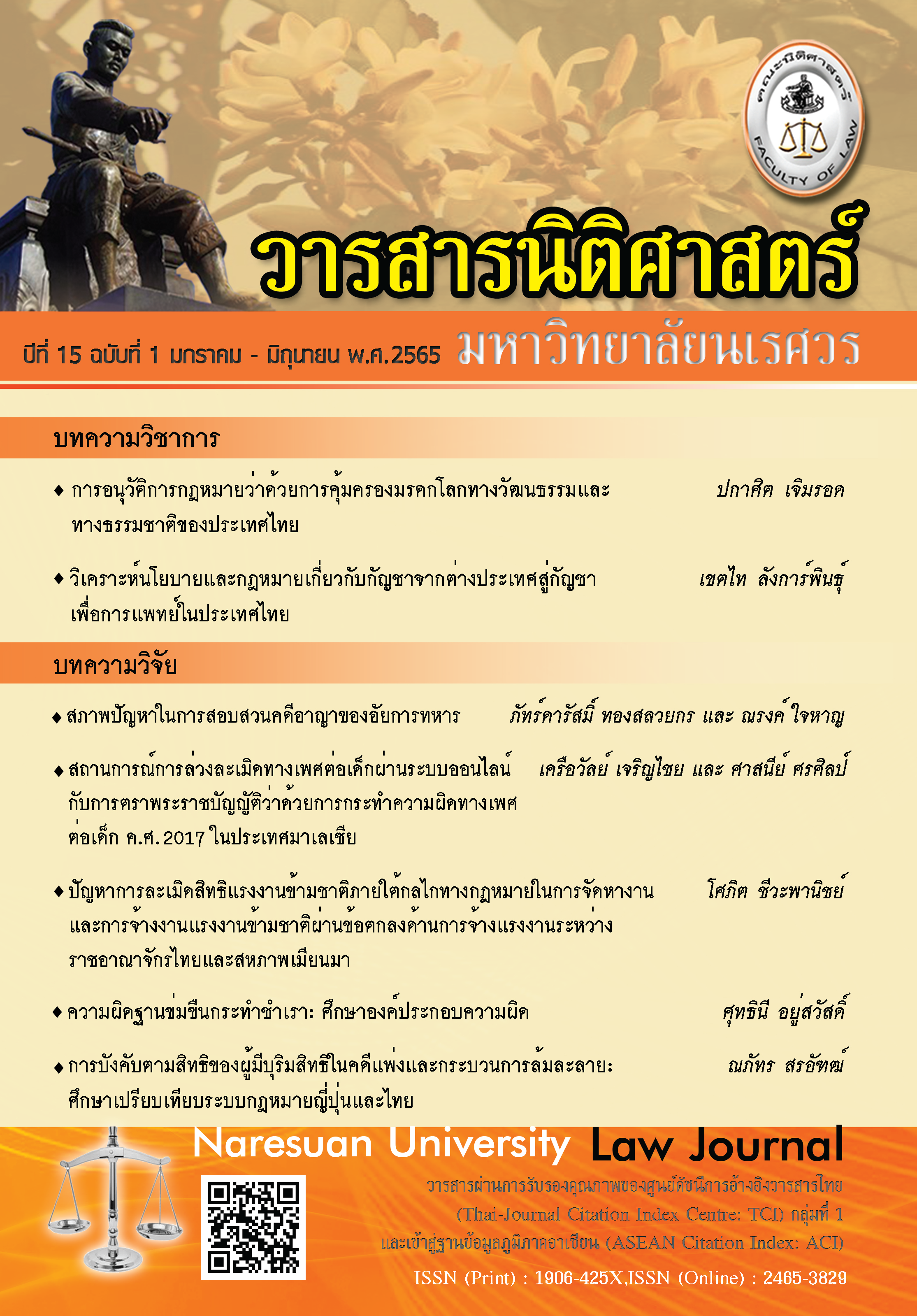The Rape Offense: A Study of the Element of Crime
Main Article Content
Abstract
The objectives of this research are (1) to study of development of the element of Rape Offence in Thai Penal Code (2) to study the element of Rape Offence in English Law (3) to compare the element of Rape Offence both Thailand and English Law and (4) to integrate this research into Criminal Law: Specific Offenses and Special Topic on Criminal Law courses.
The results of this research found that (1) the definition “Penetrate” in Penal Code Section 1 (18) tends to limit the nature of the action that a woman can do for penetrating another person (2) The problem occurred when person who commits an offence by penetrating to the vagina or anus of another person with a part of his or her body or anything else constitutes Sexual Assault Offence (Section 278 paragraph 2), not Rape Offence (Section 276). Although to offences have equal penalty, the former seems to be lighter than the latter. (3) Sexual Offences Act 2003 Section 1 “Rape” has the element of crime called Mens Rea that is, the person who commits an offence does not reasonably believe that the victim consents. If the offender penetrates the vagina, anus or mouth of another person with his penis and he reasonably believe that the victim consents, he will be lacked of Mens Rea. However section 276 does not provide that element, so it is necessary to bring the mistake of victim consents for considering. Unfortunately, the element of the reason is absent.
Article Details
References
Allen, Michael J., and Ian Edwards. Criminal Law. 15th ed. Oxford: Oxford University Press, 2019.
Card, Richard. Criminal Law, 19th ed. Oxford: Oxford University Press, 2010.
Elliott, Catherine, and Frances Quinn. Criminal Law. 11th ed. Harlow: Pearson Education Limited, 2016.
Elvin, Jesse. “The Concept of Consent under the Sexual Offences Act 2003.” Journal of Criminal Law 72, no.6(2008): 519-521.
Kanit Na Nakorn. Criminal Law: Specific Offenses. 9th ed. Bangkok: Winyuchon Publication House, 2006. [In Thai]
Kiatkhachon Watchanasawat. The Explanation of the Criminal Law Volume 1. 10th ed. Bangkok: Bolsiam Printing (Thailand), 2019. [In Thai]
LawTeacher. “DPP v Morgan (1976) ac 182.” Accessed February 10, 2022. https://www.lawteacher.net/cases/dpp-v-morgan.php.
LawTeacher. “R v Kirk (R v PK; R v TK) [2008] EWCA Crim 434.” Accessed February 10, 2022. https://www.lawteacher.net/cases/r-v-kirk.php.
Monaghan, Nicola. Criminal Law. 6th ed. Oxford: Oxford University Press, 2020.
Nattawan Duangkangtai. “The Offence of Rape: A Study of the Extent of Person’s Consents.” Master’s thesis, Dhurakij Pundit University, 2015. [In Thai]
Pokpong Srisanit. “Revision of Criminal Code on Sexual Offences: New Meaning and New Criminal Penalty of Rape Offense.” Accessed March 1, 2022. https://www.the101.world/rape-in-thai-law/. [In Thai]
Pricha Aupayokin. “Sexual Intercourse in the Elderly. Ministry of Public Health Department of Thai Tradition and Alternative Medicine.” Accessed March 1, 2022. https://thaicam.go.th/เพศสัมพันธ์ในผู้สูงอายุ/. [In Thai]
Saharat Kiti Suphakan. Jurisprudence and Judgments: Criminal Law. 8th ed. Bangkok: Amarin Printing & Publishing, 2018 [In Thai]
Soraya Hour. “BDSM and Consensus: How to play without crossing the line and becoming harassment?.” BBC News. Accessed May 21, 2018. https://www.bbc.com/thai/international-44140482.
Suttinee Yusawat. The Content of the 27th Revision of Criminal Code: Study on Rape. Naresuan University Law Journal 12, no.2(2019): 53-63. [In Thai]
Suttinee Yusawat. The offender intoxicated himself and mistook that the injured person give him the consent. Naresuan University Law Journal 7, no.2(2015): 18-35. [In Thai]
Twekiat Menakanist. The Criminal Code Annotated. 45th ed. Bangkok: Winyuchon, 2021. [In Thai]
Twekiat Menakanist. The Explanation of the Criminal Law: Specific Offenses and Petty Crime. 17th ed. Bangkok: Winyuchon Publication House, 2019. [In Thai]
Twekiat Menakanist. The New Perspective of Criminal Law. Winyuchon, 2008. [In Thai]
Yoot Saeng-Uthai. The Basic Knowledge about General Principle Law, 21th ed. Bangkok: Thammasat, 2017. [In Thai]


